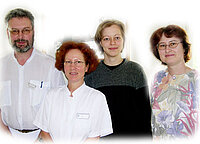Investigations of the familial and social situation, coping strategies and opinions of people, suffering from hereditary spastic paraplegia and of their relatives to genetic diagnosis
Applicant:
Dr. med. Dipl.-Med. Friedmar R. Kreuz, Facharzt für Humangenetik, Oberarzt Institut für Klinische Genetik Medizinische Fakultät Carl Gustav Carus Technische Universität Dresden Fetscherstraße 74 D-01307 Dresden
E-mail: friedmar.kreuz@mailbox.tu-dresden.de
The hereditary spastic paraplegias are a group of late-onset, genetically caused, neurodegenerative disorders that can appear at any age. Both the clinical manifestations with the main symptoms of a spastic gait disorder, muscular hypertonia and hyperreflexia, and the age of onset usually vary within the family and between families. The variation of the symptoms reflects the genetic heterogeneity. For a small number of pure and complicated paraplegias, not only clinical, instrumental, laboratory diagnostics and imaging are available, but also genetic diagnosis is possible. With the availability of genetic diagnosis, the disease can be predicted in persons at risk and in unborn children (prenatal). This offers a new field for the investigation of psycho-social aspects in another neurodegenerative disorder. Our study continues earlier investigations carried out in families with other late-onset neurodegenerative disorders (Huntington’s disease, Heredoataxias), hereditary cancer disorders (hereditary breast and ovarian cancer, hereditary non-polyposis colorectal cancer syndrom), and studies in pregnant women with pathological sonographic findings and pathological results for the so-called triple test. We aim to investigate the opinions and attitudes of families with spastic peraplegia towards genetic diagnosis, their coping strategies, and the social and family situation. The investigation will be carried out by questionnaires (anonymous when requested) adapted from our previous studies. A random sample will be interviewed personally or by phone. We wish to evaluate (1) the differences and/or similarities between the attitudes and opinions of the affected persons and their relatives, (2) the need for genetic counselling and diagnostics, and (3) the deficits, resources and family structures in the process of coping. The results of the study should optimise medical and psychological support for the affected families





